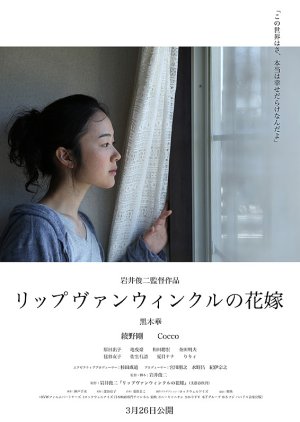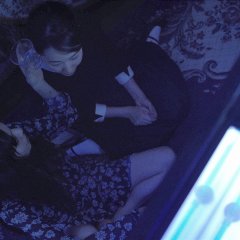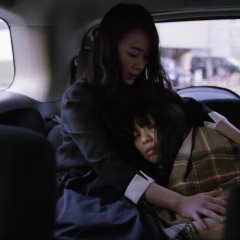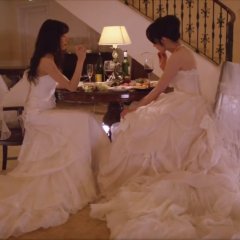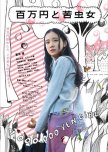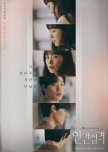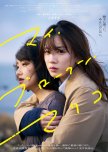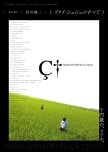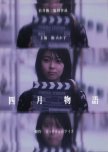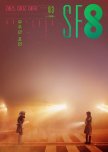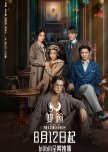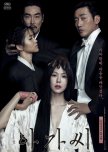Dispatched teaching staff member Nanami meets Tetsuya through SNS and decides to marry him. She doesn't have many relatives and turns to an agency called "Nandemoya", run by Amuro. She asks the agency to send people to her wedding and for some to pretend they are her relatives. Early in her marriage, Nanami finds Tetsuya having an affair, but her mother-in-law, Kayako, insists Nanami is having the affair. Due to this, Nanami has to leave her home. Amuro gives Nanami, who is in trouble, odd part-time jobs. Edit Translation
- English
- Português (Brasil)
- Polski
- magyar / magyar nyelv
- Native Title: リップヴァンウィンクルの花嫁
- Also Known As: Rip Van Winkle no Hanayome , Rip Van Winkle's Bride , The Bride of Rip Van Winkle
- Screenwriter & Director: Iwai Shunji
- Genres: Life, Drama
Where to Watch A Bride for Rip Van Winkle
Ppv (sub)
Cast & Credits
- Kuroki Haru Main Role
- Ayano GoAmuro YukimasuSupport Role
- CoccoSatonaka MashiroSupport Role
- Hara HidekoTsuruoka KayakoSupport Role
- Jibiki GoTsuruoka TetsuyaSupport Role
- Wada SokoTakashima MasatoSupport Role
Reviews

This review may contain spoilers
One of the most important contemporary directors of today, Shunji Iwai gives us a suspenseful emotional ride in his latest film "A Bride for Rip Van Winkle". It reminds me a lot of "All about Lily Chou Chou"(also directed by Iwai) on how it uses the internet as the main element in the movie, how it affects characters minds and their relationship, simple chatting before social media now. This movie will make you realize how social media affects our society, how most of us make it our safe haven and sometimes create a fake identity and how that fake identity would factor in constructing our own, not giving much of a story away, the theme would be so obvious if you compare the 2 relationships of our main character had here, one living with lies and the other ironically real. Having said that, the theme in this movie was so strong and possibly the first time that was explored to this extent and just like Iwai said "I would like to show how we take to living in this world that our ancestor left us", so thought provoking indeed.With 3 hours long this is perhaps the second longest Japanese movie I've ever seen next to Love Exposure and that is mainly because most climactic scenes were all shown in slow motion, it seems the director reiterates the point of what we should feel, some may be bother by it but I'm not as I see the reason for it, scenes before those slow-mos were so subtle so it's like a storm after a calm sea. Another reason is the criticism he is known for which is his film has a tendency to drag and some scenes were like that especially scenes that has metaphor in it or with meaningful dialogues, if you're like me who is into that then this will make the movie more engaging to you.
The film is basically a character study of a Nanami(Haru Kuroki), a part time teacher who is like a shadow, she has no personality, the film lets us follow her as how her character develops throughout the story, with Iwai's directing and Haru Kuroki's acting this film is an immersive experience. You can separate the movie into 3 parts the classic fall, perserverance, and finding happiness. The first act started when Nanami meets this guy on social media then without much thinking she eventually marries him, but the problem is she didn't have the ideal family, her parents were divorced and seems like their relatives broke the ties between them. Then she decided to hire Amuro(Gou ayano), a guy she met on social media, a jack of all trade ala Gintama, it is Amuro who provide fake relatives to her wedding. The end of the first act is strong as Nanami is humiliated and defeated and that first act sets up to a more interesting second and even third act. When I said suspenseful emotional ride I mean it as plot twist after plot twist, lies after lies got revealed but the biggest mystery is the title itself "A Bride for Riple Winke", what is relevance of that title in the story? Who is Riple Winkle? Well the way the movie reveals it is so clever, it's a work of a mad genius and definitely I didn't see that coming at all. Just like most of Iwai's films this film features misfits characters, those cut from society, this movie will depict their engaging journey and how will those character find love and happiness. Although with that engaging premise and roller coaster of emotions I had, still one important question in the movie remains a mystery although I'm sure that that was intended, I experienced that in All About Lily Chou Chou and I experienced it again here, I just don't know what to feel, I just thought of giving you a heads up cause that might annoyed you as well.
Great Cinematography to me is not just beautiful but also meaningful, it's just like in painting great painting should fascinate you, it should make you look closer to examine the details and not just stare at one and says "this painting is beautiful", you could have all the colors on your palette but if it's dull it's dull. Movies by Iwai are the best example for this they have the best cinematography I've ever seen that makes the movie so immersive and this movie is not an exception, his emphasis for lighting was really obvious here, it is stunning, extracting the natural colors in a scene, a perfectionist he truly is. Music really adds up to the emotion in those melodramatic scenes, particularly is that one scene with Nanami after the first act, the Visuals, the Slow-mo, the Music, the acting, it is perfect, I literally pause the movie and gather myself, stupid smile left on my face, instant goosebumps.
Iwai really loves using subtle actors in his films and the reason for that is because that kind of acting is most suited for his style of filming, before he had Aoi Yu and this time Haru Kuroki. Haru reminds me of Aoi Yu a lot they can even switch roles here and the strength of the character will remain the same, of course I'm not saying Aoi Yu is better, they are equally talented and Haru might even have some edge in drama and definitely in comedy. About haru's performance, I am one hundred percent convinced that this was her best performance I've seen from her and mind you I've seen a lot where she is considered great namely "emperor's cook" "juhan shutai" "little house" "solomon's perjury". The character she played here is so complex that one wrong move would make that character annoying, one wrong casting and the movie would be ruined, hard to explain it without laying spoilers, only you would realize what I meant when you watched it. There is one character I can't reveal here because of spoilers and it's a shame because I was equally impressed with her with haru and her name is not even included here on MDL. The character is crippled yet strong; she's like a playful spirited fairy and those eyes omg. The chemistry between them was magnetic, a total contrast to each other yet they share similarities, they want happiness. Gou Ayano although not as good as those two, it is his charisma that makes the character more mysterious and that is really important as that character is somewhat the one who drives the story. I have this theory about him that I will post on the comment section if you want, just click the spoiler button.
Movies like this makes me realize why I was fascinated, why I admire Japanese cinema so much, it is just that there is no other country that can offer me a story like this. Movie like this make me realize what kind of taste I have for movies, why I crave for original plot with clever twist, why I love thought provoking themes as those makes the movie to me an immersive experience. With that said, even with some draggy scenes or things remains unanswered I just couldn't give this lower than 9. Not a masterpiece but a must watch.
Check my Blog for other reviews & other JDramas stuffs. (。◕‿‿◕。)
https://thatjapanesedramaguy.blogspot.com/
Was this review helpful to you?

Iwai explores loneliness, longing, companionship, destruction and construction of Japanese family, the rigid nature of Japanese society in the modern age. This makes Bride both a affirmation and subversion of Iwai's earlier films that I've watched like Love Letter, All About Lily Chou Chou and Hana and Alice. If those films reflects nostalgia, Bride seeks to redefine how the age of technology may bring people closer but also further and how this creates and define human connection.
Bride still incorporates Iwai signatures like sun flares, soulful montage, instrumental music and bringing in small scenes to bigger ones. Yet, Bride stands as its own. It's not as romantic as Love Letter of Hana and Alice nor as the coming-of-age of All About Lily Chou Chou. Despite a 12-year hiatus, Iwai doesn't lose his touch. He is still a very lyrical storytelling in a 3-hour emotional tale driven by an impressive cast, beautiful cinematography and heart whelming music.
When it comes to cinematography, Iwai's films are on the top of list. But of course, the credit goes to the film's cinematographer, Chiga Kanbe. What I love about Bride is how Iwai (and Kanbe) tells some much with its visuals and music that doesn't overpower each other even if sometimes, the dialogue is barely heard. The music by Mako Kuwabara embraces its stunning visuals. The overall tone is filled with sheer melancholy reflected with the littered cold colors, we too, are plunged in Kuroki's trauma paired with unstable camera angles showing a distorted vision.
Iwai knows how to tug at your heartstrings. He knows how to many silent shots mean so much more later. And finally, he knows how to build up drama and tension. It's 3 hours long (shorter in other countries) but the tension never subsides and the reveal particularly of Ayano Go and Cocco particularly laid down every detail shown prior to it. It makes the execution so satisfying. Yes, 3 hours is very long. Overly long and the film could've been shorter but very scene counts. Every scene matters. Though they seem random, they're not. That's how I felt watching this.
The cast, led by Hana Kuroki has amazing chemistry together and each of their characters contrast one another that brings out the personalities more. It's not a lopsided portrayal despite Mashiro (Cocco)'s later appearance in the second half. These characters aren't stock or just for display, they are there for a reason and their characters are explored.
Kuroki plays Nanami, a timid doe-eyed wallflower. Kuroki embodies a certain innocence that makes Nanami's somewhat bittersweet ending...worthwhile. She shines, in a subtle, very modest way but she shines. Though I would say Go is my favorite. He just has this charisma that pushes its way through. Playing a jack-of-all-trades, part Mephistopheles, he has done it with such clarity. Cocco is the light of the film (as ironic has that sounds given her character's fate) because of how vibrant and how lively she is compared to Kuroki's character.
Iwai doesn't sugarcoat these characters. He establishes them as such and moves on as much, making their emotions and experiences so much more connective with the viewer. He shows Nanami as awkward and docile by her experiences in school, having no relatives to invite at her wedding and eventually her own marriage.
Kuroki and Go stared in Flower of Shanidar (2013) which explains their good chemistry. But Kuroki and Cocco also share this same chemistry particularly because they're opposites of each other which really brings out their own respective personalities. Perhaps their bond is more than sisterly, maybe even erotic but I see it as more platonic bond of two lonely women, trying to find comfort in a directionless world.
Very much like Rip Van Winkle, these two women wake up in a world that breaks away from their past and try to make the most out of it...to be happy.
Bride also stands out because of how symbolic things are and how metaphorical it is. There is a scene where Kuroki approaches Go, some might see as romantic but Go's lines are metaphorical which relates back to the reveal of both his and Cocca's character. Seeing how Iwai reverts that and how Iwai chooses dialogue as a vital component in storytelling.
Finally, I want to say that there is so much suppressed emotions in this film which perhaps echoes the rigidity of Japanese social mores. Cocca's occupation is a very clever and important choice that relates to that. Not going to mention here explicitly but her job embodies the freedom and rejects this rigidity. Overall, it ties back to what the films show. Leaving yourself bare and exposed is a more intimate emotion where throughout the film, you suffocate by how much people are keeping and how fake they can be especially in this digital age.
Was this review helpful to you?

